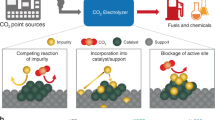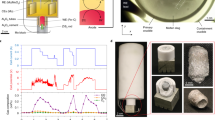Abstract
THE metals which can be extracted in large amounts from aqueous solutions of their salts by electrowinning are Cr, Mn, Co, Ni, Cu, Zn, Ga, Cd, In and Tl. Gilroy1 specifies an annual electrowinning production for 1971 of 2,400,000 tons of Zn and 540,000 tons of Ca, 53% and 10% respectively of total production at that time. We describe here a modification to the established electrowinning technique which lowers the energy consumption of the process.
This is a preview of subscription content, access via your institution
Access options
Subscribe to this journal
Receive 51 print issues and online access
$199.00 per year
only $3.90 per issue
Buy this article
- Purchase on Springer Link
- Instant access to full article PDF
Prices may be subject to local taxes which are calculated during checkout
Similar content being viewed by others
References
Gilroy, D. The Electrowinning of Metals, Industrial Electrochemical Processes (ed. Kuhn, A.) Ch. 6 (Elsevier, New York, 1971).
Browall, K. W. & Hanneman, R. E. General Electric Technical Information Ser., Rep. No. 75CRD012 (1975).
Coughlin, R. W. & Farooque, M. Nature 279, 301–303 (1979).
Coughlin, R. W. & Farooque, M. (IC & E).
Farooque, M. & Coughlin, R. W. Fuel (in the press).
Latimer, W. M. Oxidation Potentials (Prentice-Hall, Englewood Cliffs, 1952).
Author information
Authors and Affiliations
Rights and permissions
About this article
Cite this article
FAROOQUE, M., COUGHLIN, R. Anodic coal reaction lowers energy consumption of metal electrowinning. Nature 280, 666–668 (1979). https://doi.org/10.1038/280666a0
Received:
Accepted:
Issue Date:
DOI: https://doi.org/10.1038/280666a0
This article is cited by
-
Iodide mediated electrolysis of acidic coke/coal suspension
Journal of Applied Electrochemistry (2008)
-
Electrochemical oxidation of acidic Alberta coal slurries
Journal of Applied Electrochemistry (1990)
-
Traitement anodique de suspensions de poudre de graphite sur des �lectrodes de m�tal d�ploy�
Journal of Applied Electrochemistry (1987)
-
Chemical evolution of CO2 by electrocatalytic oxidation of vanadium-impregnated coke anode material
Journal of Applied Electrochemistry (1986)
-
Review of Developments in Electrometallurgy, 1980
JOM (1981)
Comments
By submitting a comment you agree to abide by our Terms and Community Guidelines. If you find something abusive or that does not comply with our terms or guidelines please flag it as inappropriate.



